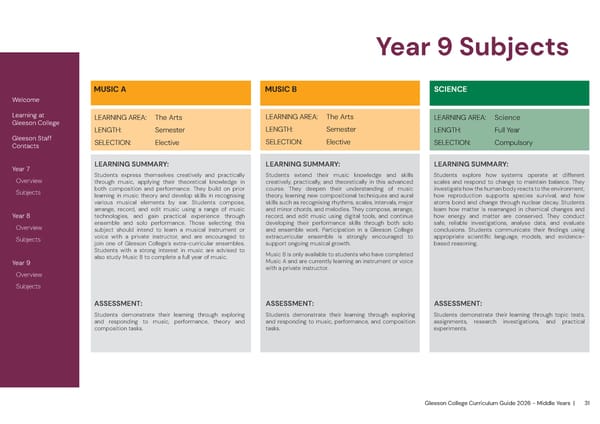Gleeson College Curriculum Guide 2026 - Middle Years | 31 Year 9 Subjects MUSIC A LEARNING AREA: The Arts LENGTH: Semester SELECTION: Elective LEARNING SUMMARY: Students express themselves creatively and practically through music, applying their theoretical knowledge in both composition and performance. They build on prior learning in music theory and develop skills in recognising various musical elements by ear. Students compose, arrange, record, and edit music using a range of music technologies, and gain practical experience through ensemble and solo performance. Those selecting this subject should intend to learn a musical instrument or voice with a private instructor, and are encouraged to join one of Gleeson College’s extra-curricular ensembles. Students with a strong interest in music are advised to also study Music B to complete a full year of music. ASSESSMENT: Students demonstrate their learning through exploring and responding to music, performance, theory and composition tasks. Welcome Learning at Gleeson College Gleeson Staff Contacts Year 7 Overview Subjects Year 8 Overview Subjects Year 9 Overview Subjects MUSIC B LEARNING AREA: The Arts LENGTH: Semester SELECTION: Elective LEARNING SUMMARY: Students extend their music knowledge and skills creatively, practically, and theoretically in this advanced course. They deepen their understanding of music theory, learning new compositional techniques and aural skills such as recognising rhythms, scales, intervals, major and minor chords, and melodies. They compose, arrange, record, and edit music using digital tools, and continue developing their performance skills through both solo and ensemble work. Participation in a Gleeson College extracurricular ensemble is strongly encouraged to support ongoing musical growth. Music B is only available to students who have completed Music A and are currently learning an instrument or voice with a private instructor. ASSESSMENT: Students demonstrate their learning through exploring and responding to music, performance, and composition tasks. SCIENCE LEARNING SUMMARY: Students explore how systems operate at different scales and respond to change to maintain balance. They investigate how the human body reacts to the environment, how reproduction supports species survival, and how atoms bond and change through nuclear decay. Students learn how matter is rearranged in chemical changes and how energy and matter are conserved. They conduct safe, reliable investigations, analyse data, and evaluate conclusions. Students communicate their findings using appropriate scientific language, models, and evidence- based reasoning. ASSESSMENT: Students demonstrate their learning through topic tests, assignments, research investigations, and practical experiments. LEARNING AREA: Science LENGTH: Full Year SELECTION: Compulsory
 2026 Gleeson College Middle Years Curriculum Guide Page 30 Page 32
2026 Gleeson College Middle Years Curriculum Guide Page 30 Page 32